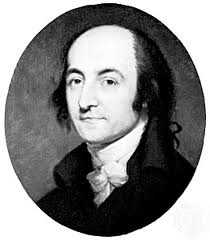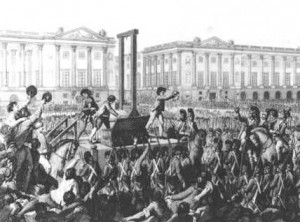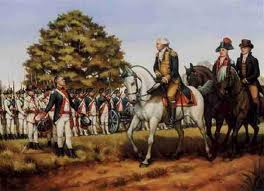
Albert Gallatin by John Austin Stevens
This biography of Albert Gallatin appears in the bibliography of Nicholas Dungan’s excellent book on America’s Swiss Founding Father reviewed here. Steven’s biography is part of the American Statesmen series which was published a little over a century ago. If this book is any indication of the quality in this series, it is a shame that these books are out print. Fortunately they are available on line.
 Stevens writes in a clear, accessible prose and states matter-of-factly:
Stevens writes in a clear, accessible prose and states matter-of-factly:
No American statesman has shown more accurate knowledge of the facts of history, or a more profound insight into its philosophy, than Mr. Gallatin.
But, he is careful not to misrepresent Gallatin’s motivations for coming to America.
It certainly was no burning desire to aid the Americans in their struggle for independence , such as had stirred the generous soul of Lafayette, that prompted this act. In later life he repeatedly disclaimed any such motive. It was rather a longing for personal independence, …
Gallatin emigrated from Geneva as a young man to start a new life in America.
He was ambitious and wanted more opportunity than could be had in his native Switzerland. He had to sneak out of Geneva in opposition to the wishes of his family and his guardian Mademoiselle Pictet. (Gallatin lost his father in 1765 and his mother in 1770. He was nine.) Things didn’t start out easily for Gallatin, but he did get the opportunity to meet George Washington as recounted by William Beach Lawrence. Gallatin and a business partner had set up a store in Fayette county Pennsylvania near the Virginia border. Washington was looking for a route suitable for a road to cross the Alleghanies, where he possessed much land.
Among the incidents connected with his (Mr. Gallatin’s) earliest explorations was an interview with General Washington, which he repeatedly recounted to me. He had previously observed that of all the inaccessible men he had ever seen, General Washington was the most so. And this remark he made late in life, after having been conversant with most of the sovereigns of Europe and their prime ministers. He said, in connection with his office, he had a cot-bed in the office of the surveyor of the district when Washington, who had lands in the neighborhood, and was desirous of effecting communication between the rivers, came there. Mr. Gallatin’s bed was given up to him,—Gallatin lying on the floor, immediately below the table at which Washington was writing. Washington was endeavoring to reduce to paper the calculations of the day. Gallatin, hearing the statement, came at once to the conclusion, and, after waiting some time, he himself gave the answer, which drew from Washington such a look as he never experienced before or since. On arriving by a slow process at his conclusion, Washington turned to Gallatin and said, ‘You are right, young man.’â€
Stevens points out that:
The look which Washington is said to have given Mr. Gallatin has its counterpart in that which he is also said to have turned upon Gouverneur Morris, when accosted by him familiarly with a touch on the shoulder.
Washington subsequently attempted to hire Gallatin to be his land agent. Gallatin declined.
Washington was not the only luminary with whom the young Gallatin dealt after his arrival in America.  Governor Patrick Henry hired Gallatin to locate 2000 acres for a another party. When Gallatin reached the age of 25, it was Robert Morris’s banking house that handled transferring Gallatin’s inheritance from Geneva to America. John Marshall, future Chief Justice of the Supreme Court, offered Gallatin a place in his office without fee. People such as these, with an eye for talent, recognized something outstanding in Gallatin, even before he became involved in national politics.
Gallatin’s political views were solidified early as a result of his experiences in America and his knowledge of what was happening in Geneva. The following is an extract from a letter Gallatin wrote in 1783, at the age of 22.
This is what by degrees greatly influenced my judgment. After my arrival in this country I was early convinced, upon a comparison of American governments with that of Geneva, that the latter is founded on false principles; that the judicial power, in civil as well as criminal cases, the executive power wholly, and two thirds of the legislative power being lodged in two bodies which are almost self-made, and the members of which are chosen for life,—it is hardly possible but that this formidable aristocracy should, sooner or later, destroy the equilibrium which it was supposed could be maintained at Geneva.
At even this early stage in his life Gallatin had arrived at some fundamental philosophical beliefs which included a healthy dose of skepticism about strong government. Stevens suggests that although there is no record of Gallatin’s views on the federal conventions for ratification, he would most likely have opposed it.
He had an abiding distrust of strong government — a dread of the ambitions of men. …Â The best government he held to be that which governs least; and many of the ablest of that incomparable body of men who welded this Union held these views.
Although Gallatin did not participate directly in the ratification convention of Pennsylvania, Stevens traces his influence through the precision of some of the arguments presented by one of its delegates, John Smilie:
In the course of his criticisms he enunciated the doctrines which were soon to become a party cry; the danger of the Constitution “in inviting rather than guarding against the approaches of tyranny;†“its tendency to a consolidation, not a confederation, of the States.†Mr. Gallatin does not appear to have sought to be a delegate to this body, but his hand may be traced through the speeches of Smilie in the precision with which the principles of the opposition were formulated and declared; and his subsequent course plainly indicates that his influence was exerted in the interest of the dissatisfied minority.
Thus, the major role that Gallatin was to play in the new government is all the more interesting. He followed Jefferson’s lead rather than Patrick Henry’ in this.  Many of his concerns have been born out with respect to consolidation rather than confederation.
While Gallatin was not a delegate for the federal ratification convention in Pennsylvania, he was a delegate to a convention for revising the state constitution. This was ironic because Gallatin was opposed to it in principle.
His objections were the dangers of alterations in government, and the absurdity of the idea that the Constitution ever contemplated a change by the will of a mere majority.
However, Gallatin was pragmatic. The convention was going to be held, regardless of his efforts to stop it, and so he assented to become a delegate. This was to be a character trait that Gallatin demonstrated again and again in his public service.
Throughout his political course the pride of mastery never controlled his actions. When debarred from leadership, he did not sulk in his tent, but threw his weight in the direction of his principles.
This convention was Gallatin’s public service apprenticeship.  From there Gallatin was elected to the Pennsylvania legislature. He was also briefly chosen by the legislature to serve as one of Pennsylvania’s senators. However, political maneuvering on the part of his enemies forced him out of this office on the basis of a residency technicality in PA.  Gallatin relinquished the post in good humor. He was then elected to the House of Representatives and served as chairman to the powerful Ways and Means committee.
Much of this book mirrors what Dungan reported in his book, although Stevens biography delves much more deeply into the financial details of Gallatin’s handling of the Treasury Department, and perhaps somewhat less detail on Gallatin’s diplomatic accomplishments. This biography also provides a different emphasis on its subject than Dungan’s volume. Steven’s biography is a bit broader in presenting the different sides of Gallatin. In one letter to his best friend, he describes his choice of wife:
… a girl about twenty-five years old, who is neither handsome, nor rich, but sensible, well-informed, good-natured, and belonging to a respectable and very amiable family.
In another, he provides his opinion on the excesses of the French Revolution. It sounds almost Jeffersonian.
France at present offers a spectacle unheard of at any other period. Enthusiasm there produces an energy equally terrible and sublime. All those virtues which depend upon social or family affections, all those amiable weaknesses, which our natural feelings teach us to love or respect, have disappeared before the stronger, the only, at present, powerful passion, the Amor Patriæ. I must confess my soul is not enough steeled, not sometimes to shrink at the dreadful executions which have restored at least apparent internal tranquillity to that republic. Yet upon the whole, as long as the combined despots press upon every frontier, and employ every engine to destroy and distress the interior parts, I think they, and they alone, are answerable for every act of severity or injustice, for every excess, nay for every crime, which either of the contending parties in France may have committed.
The picture painted by Stevens is of a man of extraordinary talents, intelligence, and character. In this both Stevens and Dungan agree.
This is truly a delightful book to read (with the possible exception of some of the drier bits detailing the budgetary details of Treasury under Gallatin). There is much more than can be adequately presented in a review. Gallatin’s role in the Whiskey Rebellion is explained and extolled by the the author.  In his view, Gallatin was the voice of reason who prevented anarchy and violent rebellion in Pennsylvania. The Federalists, on the other hand, sought to pin responsibility for fomenting it on Gallatin.

Throughout the book, Stevens highlights the principles that Gallatin believed in regarding the interpretation of the Constitution he had been skeptical of prior to ratification. Gallatin believed in the supremacy of the House of Representatives concerning its use of the purse strings and made his opinions clear in one debate between the Republicans and the Federalists in the House.
The Federalists insisted that a discussion of the merits of establishments was not in order when the appropriations were under consideration; that the House ought not, by withholding appropriations, to destroy establishments formed by the whole legislature, that is, by the Senate and House; that the House should vote for the appropriations agreeably to the laws already made. This view was sanctioned by practice. Mr. Gallatin immediately opposed this as an alarming and dangerous principle. He insisted that there was a certain discretionary power in the House to appropriate or not to appropriate for any object whatever, whether that object were authorized or not. It was a power vested in the House for the purpose of checking the other branches of government whenever necessary. He claimed that this power was shown in the making of yearly instead of permanent appropriations for the civil list and military establishments, yet when the House desired to strengthen public credit it had rendered the appropriation for those objects permanent and not yearly. It was, therefore, “contradictory to suppose that the House was bound to do a certain act at the same time that they were exercising the discretionary power of voting upon it.â€
Gallatin also argued on the interpretation of the Constitution concerning the separation of powers in the making and ratification of treaties, the funding of appointments, and numerous other issues. He was at times at odds with his own party. He was a man of principle who opposed dissolution of the National Bank in contention with first Jefferson, and then Jackson. Gallatin was also a man of definite opinions about the capabilities of friends and foes alike:
Andrew Jackson, Gallatin said, “was an honest man, and the idol of the worshipers of military glory, but from incapacity, military habits, and habitual disregard of laws and constitutional provisions, entirely unfit for the office of president.†John C. Calhoun he looked upon as “a smart fellow, one of the first amongst second-rate men, but of lax political principles and an inordinate ambition, not over-delicate in the means of satisfying itself.†Clay he considered to be a man of splendid talents and a generous mind; John Quincy Adams to be ‘wanting to a deplorable degree in that most essential quality, a sound and correct judgment.’
Stevens leaves the reader with an appreciation of a brilliant man to whom America owes a great deal. Gallatin would have been well-satisfied with this depiction.
 The posts are coming!
The posts are coming!

2 comments
Thanks for that informative review. I once owned a home in the Albert Gallatin School District.
[Reply]
I’m glad that you liked it. I enjoyed this book and the one by Dungan. I hope to visit his home some time.
[Reply]
Leave a Comment